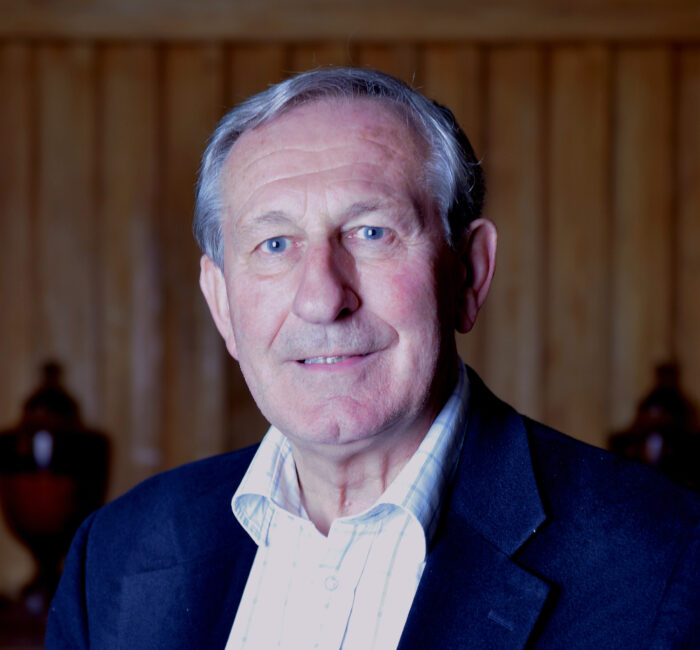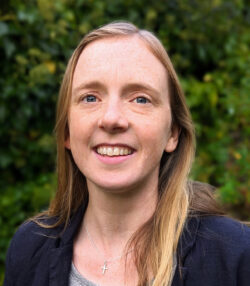In our third Fellowship feature, we focus on Postdoctoral By-Fellowships and the pioneering role Churchill College played in providing college affiliation for those in university research roles at Cambridge. We also meet one of our newest incoming PDBFs, Emma Boland.
It can be alienating to be employed in a departmental research role and have no access to the social and intellectual benefits of college life. Churchill created its Postdoctoral By-Fellowship (PDBF) as a direct response to this need and around 16 PDBFs are now appointed by the College each year. Although many other colleges now have similar schemes, Churchill was in the vanguard of providing college affiliations to postdocs, and in terms of the number of positions and the status and privileges offered we were and remain among one of the most generous of all the colleges.

“The College has now offered in excess of 100 PDBF appointments & I think the College’s commitment to supporting the University’s ‘non-established’ staff is something we can be very proud of.”
Professor Ken Siddle
A short history of PDBFs at Churchill
The idea behind providing College affiliation for postdoctoral researchers working within the University and its associated institutes grew out of discussions between Professor Ken Siddle and the then Senior Tutor Richard Partington, when Professor Siddle first became Vice-Master in 2012. Professor Siddle was heavily involved in the creation and evolution of the Graduate School of Life Sciences in his University role and was aware of moves within the University to better support the large number – around 4,500 – of contract research staff (postdocs), mostly holding short-term positions with a median duration of around 3 years. Unlike students and tenured academic staff, postdocs were effectively excluded from college membership, and whilst Churchill had for some years offered limited dining rights to postdocs working with Fellows of the College, very few took up this opportunity. In 2013, the pair proposed to Governing Body that the College should offer affiliation to up 10 postdocs per year, for 2 years initially with the possibility of renewal for a further 2 years. Governing Body approved the title of ‘Postdoctoral By-Fellow’, with a level of privileges comparable to other classes of By-Fellowship and the first cohort of PDBFs was admitted in October 2013. The PDBF offer was soon changed to 3 years (conditional on a continuing university position) and the privileges were increased.
Around the same time in 2013, the University established an Office of Postdoctoral Affairs (OPdA), with Karina Prasad as its administrative head, later to become a Professional By-Fellow at Churchill. The OPdA morphed into the Cambridge Postdoc Academy, with its offices and main base in Eddington.
From the start, PDBFs were advertised and filled by annual open competition with a ‘light touch’ assessment process and a policy that appointments should broadly reflect the numbers of postdocs in different disciplines across the university. There was no specific requirement regarding engagement within the College, but involvement in college teaching and mentoring postgrads was encouraged and a series of postprandial talks was trialled. After a few years the scheme was expanded to offer PDBFs to a small number of research fellows appointed by the Winton Centre for Risk and Evidence Communication (of which Prof David Spiegelhalter was head at the time) and the Isaac Newton Trust.
The College’s PDBF scheme has now matured, and as the current Vice-Master of the College Dr Adrian Barbrook reflects, ‘given it a vibrant and lively community of academics which links to both SCR and MCR, from a constituency that often miss out on the connections, inspiration and support that we can offer. It has been pleasing to see a number of past PDBFs subsequently become full Fellows and in that way further their commitment and engagement with out activities.’
Meet Dr Emma Boland

Dr Emma Boland is a polar scientist and climate science communicator who recently joined the Churchill Fellowship community as a Sustainability PDBF. Emma is co-director of AI for the study of Environmental Risks Centre for Doctoral Training (AI4ER), based at the Department of Earth Sciences and was motivated by the opportunity to strengthen links with the University. It felt natural to apply to Churchill due to her links with the nearby Department of Applied Mathematics & Theoretical Physics (DAMTP) and Earth Sciences, alongside her appreciation of the College’s beautiful large green campus.
I’m looking forward to getting to know the rest of the SCR community, with the hope that I can tailor my role as a Sustainability By-Fellow to their needs and interests. That could be helping the College become more sustainable or providing education on science and policy relating to climate change.
Emma grew up in Edinburgh, Scotland before moving to study for a Masters in Physics at Imperial College London. After her masters, Emma decided to pursue a PhD in Atmospheric Science, having enjoyed the subject at degree level, and being put off lab-based physics after an unenjoyable Masters project. After meeting with several research groups, she talked with researchers in Cambridge who offered her instead a project in Oceanography, with the chance to visit the Southern Ocean, joint between DAMTP and the British Antarctic Survey. She didn’t know anything about Oceanography but jumped at the chance!
I ended up with a thesis studying the dynamics of the Southern Ocean, using a combination of simple and complex computer models with observations. I helped gather the observations on a research cruise to the Southern Ocean which was a real eye-opening experience!
Since finishing her PhD, Emma has worked as a postdoc at the British Antarctic Survey (BAS), a government research institute with headquarters in West Cambridge. They run the UK’s science operations in the Antarctic region, including research bases on the continent, the new research vessel the RRS Sir David Attenborough, and multiple field experiments. BAS is also home to scientists like herself, from a range of disciplines but all specialising in the Polar regions.
Emma studies the polar oceans, a crucial part of the global climate system. As Emma explains; ‘most of the heat and carbon dioxide that we have added to the climate system since the industrial revolution has ended up in the ocean, and most of that enters the ocean in the polar regions. I use computer models to study what controls the amount of heat and carbon that enters the polar oceans, and how what goes on in the polar oceans affects the rest of the global ocean. Understanding how these processes work now is crucial to predicting how they will continue to change in the future.’
Emma’s PhD supervisors, Professor Emily Shuckburgh (Director of Cambridge Zero) and Professor Peter Haynes (DAMTP), were both very inspiring to her coming into the area of Oceanography and climate science and continue to be important collaborators, supporters, and inspiration.
Emma’s long-term aspirations are all about the kind of researcher she wants to be, rather than aiming for a specific role. She aspires to being an inclusive and supportive leader of a research group that values each individual’s strengths. Emma believes the next advancements in her field will come through the interdisciplinary work of computer modellers, data scientists, and physical scientists like herself, which is why she is increasingly working with machine learning techniques and she hopes to create a group combining researchers with expertise from all these fields.
